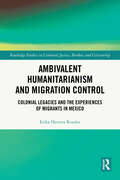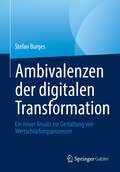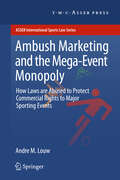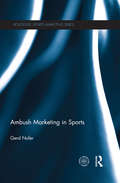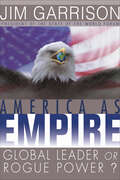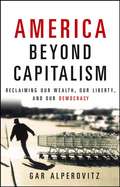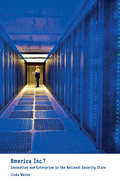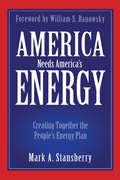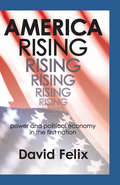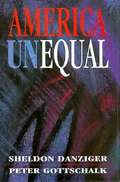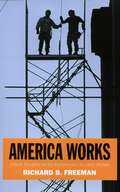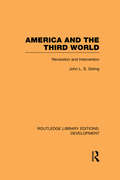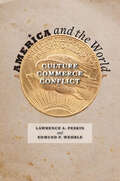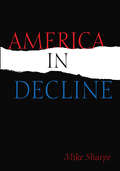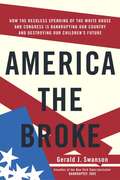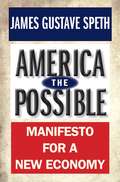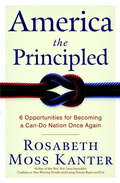- Table View
- List View
Ambivalent Encounters
by Jenny HubermanJenny Huberman provides an ethnographic study of encounters between western tourists and the children who work as unlicensed peddlers and guides along the riverfront city of Banaras, India. She examines how and why these children elicit such powerful reactions from western tourists and locals in their community as well as how the children themselves experience their work and render it meaningful. Ambivalent Encounters brings together scholarship on the anthropology of childhood, tourism, consumption, and exchange to ask why children emerge as objects of the international tourist gaze; what role they play in representing socio-economic change; how children are valued and devalued; why they elicit anxieties, fantasies, and debates; and what these tourist encounters teach us more generally about the nature of human interaction. It examines the role of gender in mediating experiences of social change--girls are praised by locals for participating constructively in the informal tourist economy while boys are accused of deviant behavior. Huberman is interested equally in the children's and adults' perspectives; her own experiences as a western visitor and researcher provide an intriguing entry into her interpretations.
Ambivalent Humanitarianism and Migration Control: Colonial legacies and the Experiences of Migrants in Mexico (Routledge Studies in Criminal Justice, Borders and Citizenship)
by Erika Herrera RosalesAmbivalent Humanitarianism and Migration Control explores the complex relationship between migrants and local aid organisations. These organisations have become indisputably relevant and highly regarded as allies to Northern Central American migrants trying to reach the United States. Thus, this book examines the implications of humanitarian actors in migration governance and bordering practices, which have serious and long-lasting effects on the lives of migrants.Through an in-depth research in Mexico, this book suggests that humanitarian organisations are ambivalent institutions because they intend to help and support individuals while reinforcing social and power inequalities. It explores the narratives, roles, and practices of humanitarian workers, and, at the same time, addresses migrants’ resistance. From an interdisciplinary approach that employs critical humanitarian perspectives, post/decolonial theories, and criminological studies, this study provides a comprehensive analysis of migration governance and migrants’ agency.A highly informative, insightful, and engaging read, Ambivalent Humanitarianism and Migration Control will appeal to students, scholars, and researchers in migration studies, border studies, sociology, and critical criminology. Given its international scope, it also will be of interest to academics, practitioners, and people in Latin America, the United States, the UK, Europe, and beyond.
Ambivalenzen der digitalen Transformation: Ein neuer Ansatz zur Gestaltung von Wertschöpfungsprozessen
by Stefan BurgesDurch technische Neuerungen wie Internet-of-Things, Machine Learning und Künstliche Intelligenz verändert sich das Marktumfeld für Unternehmen schnell und ständig. Darauf gilt es in der Unternehmensführung ebenso schnell zu reagieren bzw. diese Neuerungen besser noch zu antizipieren. In seinem Buch richtet Stefan Burges seinen Blick nicht nur auf die technischen Möglichkeiten, sondern auch auf den Menschen. Er unterscheidet zwischen Arbeiten und Prozessen, die durch Digitalisierung an Schnelligkeit und Zuverlässigkeit gewinnen, und Abläufen, die auf der Kommunikation zwischen Menschen beruhen. Folgerichtig analysiert Burges im ersten Teil des Buches den Wertschöpfungsprozess, die Protagonisten – digitale Systeme und Mitarbeiter – sowie deren Kommunikation. Im zweiten Teil werden strategische Handlungsfelder identifiziert und Alternativen für einen nachhaltigen Wertschöpfungsprozess vorgestellt.
Ambulantes Operieren in Klinik, Praxis und MVZ: Rahmenbedingungen - Organisation - Patientenversorgung (Erfolgskonzepte Praxis- & Krankenhaus-Management)
by Christoph Lussi Thomas StandlIn diesem Buch beschreibt ein erfahrenes Herausgeber- und Autorenteam, wie die praktische Umsetzung des ambulanten Operierens in der Klinik, in einer Praxis oder in einem medizinischen Versorgungszentrum effektiv und ökonomisch gelingt. Das Werk wendet sich an Ärzte aller Fachdisziplinen, die in ambulanten OP-Einrichtungen arbeiten sowie an Klinikdirektoren, Verwaltungsdirektoren und Gesundheitsökonomen. Die 3. Auflage erscheint inhaltlich und strukturell komplett überarbeitet und trägt den neuesten Entwicklungen Rechnung. Der Schwerpunkt des Werkes liegt dabei auf den strukturellen und organisatorischen Aspekten des ambulanten Operierens, wobei auch für Anästhesisten und Operateure vieler Fachrichtungen medizinisch relevante Aspekte dargestellt werden.
Ambush Marketing & the Mega-Event Monopoly: How Laws are Abused to Protect Commercial Rights to Major Sporting Events (ASSER International Sports Law Series)
by Andre M. LouwThis book undertakes a critical examination of commercial rights to sports mega-events (focusing on sponsorship), the exclusivity of such rights and the legal implications of the modern mega-event sponsorship model. It examines ambush marketing of events and the law's treatment of ambushing (specifically in the form of sui generis event legislation) in a review of 10 major jurisdictions selected on the basis of the importance of the events they are to host in the near future or have hosted recently, and the relevant domestic legislation. It critically examines the legitimacy of such commercial rights protection by means of the use of laws in the context of accepted principles of intellectual property law, competition law and human rights law. Specifically, it questions the legitimacy of the creation of statutory 'association rights' to mega-events, and considers potential future developments in respect of the law's treatment of mega-event commercialisation. Valuable for practitioners and academics (in the fields of sportslaw/sponsorship/marketing/intellectual property law); sports administrators (sports governing bodies); corporate sponsors of sports and other events; potential mega-event host governments and law-makers; civil rights organisations.
Ambush Marketing in Sports
by Gerd NuferAmbush marketing is a strategy by which a company or organisation uses their marketing communications to associate themselves with an event without being an official sponsor or authorised partner or licensee. It has become a particular concern in the marketing of major sports events, with international sponsorship and branding properties worth many millions of dollars. Ambush Marketing in Sports is the first book to offer comprehensive analysis of the theoretical and practical implications of ambush marketing. Drawing on cutting-edge empirical research data, the book outlines an innovative model for understanding ambush marketing and offers practical advice for all stakeholders, from sponsors and event organisers to media organisations. The book examines the opportunities and the risks of ambush marketing, assesses the legal, ethical and business dimensions, and offers advice for preventing ambush marketing in a range of contexts. Fully supported throughout with examples and cases from major international sports events, such as the FIFA World Cup and the Olympic Games, this book is important reading for any student, researcher or practitioner with an interest in sport marketing, sport business or event management.
Amelia Rogers at Tassani Communications (A)
by Linda A. Hill Melinda B. ConradDescribes a conflict that has arisen between an account manager and a creative director at Tassani Communications, a Chicago-based advertising agency which is making the transition from entrepreneurial to professional management. The client, the marketing director of a muffler repair chain, has called the account manager to complain about the creative director's behavior. The account manager must figure out what to do. The object is to provide students with an opportunity to grapple with the challenges of managing relationships with peers and superiors. Students can discuss managing 1) cross-departmental relationships, 2) interpersonal conflicts, and 3) creativity.
Amelia Rogers at Tassani Communications (B)
by Linda A. Hill Melinda B. ConradSupplements the (A) case.
America As Empire: Global Leader or Rogue Power?
by James GarrisonIn America as Empire, Jim Garrison urges us to face up to the complexities and responsibilities inherent in the indisputable fact that America is now the world's single preeminent power. "America", Garrison writes, "has become what it was founded not to be: established as a haven for those fleeing the abuse of power, it has attained and now wields near absolute power. It has become an empire." Garrison traces the roots of the American empire to the very beginnings of the republic, in particular to the historic willingness of United States' to use military might in the defense of two consistent --- if sometimes contradictory --- foreign policy objectives: protection of American commercial interests and promotion of democracy. How long can the American empire last? Garrison looks at American history within the context of the rise and fall of empires and argues that the U. S. can gain important insights into durability from the Romans. He details the interplay between military power, political institutions, and legal structures that enabled the Roman empire at it's apogee to last for longer than America has as a country. But the real question is, what kind of empire can and should America be? As the sole superpower, America must lead in shaping a new global order, just as after World War II Roosevelt and Truman took the lead in shaping a new international order. That international order is now crumbling under the pressures of globalization, persistent poverty, terrorism and fundamentalism. Garrison outlines the kinds of cooperative global structures America must promote if its empire is to leave a lasting legacy of greatness. Garrison calls for Americans to consciously see themselves as a transitional empire, one whose task is not to dominate but to catalyze the next generation of global governance mechanisms that would make obsolete the need for empire. If this is done, America could be the final empire.
America Beyond Capitalism: Reclaiming Our Wealth, Our Liberty, And Our Democracy
by Gar Alperovitz<p>This book argues that the only way for the United States to once again honor its great historic values--above all equality, liberty, and meaningful democracy--is to build forward to achieve what amounts to systemic change. <p>If the current political-economic system is no longer able to sustain equality, liberty, and meaningful democracy, what specifically do we want? And why, specifically, should anyone expect what we want to be any better than what we now have? And how, specifically, might what we propose deal with the everyday problems now facing most Americans? And finally, even if we can say what "system" would be better, why, specifically, do we think it might be attainable in the real world?
America Fascism and God
by Davidson LoehrReligion and politics have always been a potent mix. History is littered with times when that combination caused sweeping death and destruction, when it fueled aggression and oppression-and when it gave fascism a religious and diplomatic face. Reverend Davidson Loehr is afraid that we may be living in such a time in America today. On the Sunday following the election on November 2, 2004, Loehr, a liberal minister in Texas, delivered a sermon titled "Living Under Fascism"-a sermon that spread like wildfire through the Internet. "I mean to persuade you that the style of governing into which America has slid is most accurately described as fascism, and that the necessary implications of this fact are rightly regarded as terrifying," the preacher told his congregation. ". . . and even if I don't persuade you, I hope to raise the level of your thinking about who and where we are now. " In this series of incisive and inspired sermons, Loehr takes aim at the unholy alliance of corporate money, political power, and religious fundamentalism that is threatening both our political and our economic democracy. But Loehr's words provide little comfort to liberals and progressives who have stubbornly clung to a radical individualism and an amoral secularism. "America, Fascism, and God" is a call-first to understand that religion has been hijacked and debased. And then to take it back.
America Inc.?: Innovation and Enterprise in the National Security State
by Linda WeissFor more than half a century, the United States has led the world in developing major technologies that drive the modern economy and underpin its prosperity. In America, Inc., Linda Weiss attributes the U.S. capacity for transformative innovation to the strength of its national security state, a complex of agencies, programs, and hybrid arrangements that has developed around the institution of permanent defense preparedness and the pursuit of technological supremacy. She examines how that complex emerged and how it has evolved in response to changing geopolitical threats and domestic political constraints, from the Cold War period to the post-9/11 era.Weiss focuses on state-funded venture capital funds, new forms of technology procurement by defense and security-related agencies, and innovation in robotics, nanotechnology, and renewable energy since the 1980s. Weiss argues that the national security state has been the crucible for breakthrough innovations, a catalyst for entrepreneurship and the formation of new firms, and a collaborative network coordinator for private-sector initiatives. Her book appraises persistent myths about the military-commercial relationship at the core of the National Security State. Weiss also discusses the implications for understanding U.S. capitalism, the American state, and the future of American primacy as financialized corporations curtail investment in manufacturing and innovation.
America Latina Logistica
by Donald N. Sull Andre Delben Silva Fernando MartinsDescribes the turnaround of America Latina Logistica, a $200 million revenue, formerly state-owned, railway in Brazil that has been restored to profitability by its CEO, a recent MBA graduate. After successfully transforming the company's operations, finances, and organization, the CEO must decide whether to acquire a trucking company and offer integrated logistics solutions to customers or stay focused on its core business of rail transportation. Provides rich data describing the details of the company's turnaround and also provides sufficient industry and financial data to analyze the strategic and financial implications of the proposed merger.
America Needs America's Energy: Creating Together the People's Energy Plan (America Needs America's Energy Ser.)
by Mark A. StansberryAn oil & gas industry expert breaks down America’s energy situation and how Americans can get involved to help develop an energy plan.It’s time for an energy revolution! Gasoline prices have been rising, and oil supply disruptions are in question. This is old news, yet nothing has been done to change it. That is because it takes people like you stepping up and getting involved, and Mark A. Stansberry is here to show you how.In his latest book, America Needs America’s Energy, Stansberry offers a frank discussion of the issues at hand, as well as realistic, achievable solutions. America cannot move forward without your involvement and your commitment to develop an energy plan. Presented in direct, no-nonsense language and containing a glossary, sample forms, and other resources on things you need to know about America’s energy situation, America Needs America’s Energy is both a great go-to guide for learning about energy solutions and a wonderful launchpad for how to move forward together in creating the People’s Energy Plan.Praise for Mark A. Stansberry and America Needs America’s Energy“Through his many years of experience, Mark Stansberry successfully challenges us toward developing a comprehensive American energy plan.” —Bill Anoatubby, Governor, the Chickasaw Nation“As Mark states, “The time has come for all of us, the people, to take control of our energy future here in America.” He and I have discussed the importance of moving inevitably toward a hydrogen economy. I believe, after reviewing all the energy options presented in his book, it should move us closer to achieving that possibility. The future is now for us and our children. We cannot wait any longer.” —Woodrow W. Clark II, MA, PhD; Qualitative economist, Clark Strategic Partners; Corecipient of the Nobel Peace Prize“America’s energy policy cannot simply be cheap energy. Mark Stansberry tells us how to break out and assume an energy-secure and dynamic future economy.” —Frank Keating, Governor of Oklahoma, 1995-2003; President, American Bankers Association
America Online, Inc.
by Krishna G. Palepu Amy P. HuttonAmerica Online's (AOL) stock price has soared nearly 2,000% since its IPO. However, there is considerable disagreement among analysts regarding the future prospects of AOL. Although many analysts are bullish on the stock, short sellers have sold around 7 million shares.
America Rising: Power and Political Economy in the First Nation
by David FelixThe United States became a great power in the last quarter of the nineteenth century and a superpower during World War II without quite knowing it. Few Americans fully appreciate the fact today. How many people know that in recent years we have had 250,000 troops in 700 bases around the world? Consider our recent history of military operations in the Caribbean, East Asia, the Far East, Middle East, Southeast Asia, Africa, and the Balkans. In America Rising, David Felix attempts to explain how and why America became a superpower by examining the political and economic factors that have driven its ascendence and their relationship throughout history.Felix begins with the dawn of America, showing how America amassed wealth and political power from the start through wars, assertions of economic might, and the creation of a cultural and philosophical base. The nation began with a political order, derived from our British origins, which enabled our pragmatic culture to take advantage of the vast wealth of a near-virgin continent. Political and economic freedom were paired, authority yielding to both freedoms. Our farmers and businessmen were dreamers, manufacturing realities out of those dreams. Felix's account then makes a point of neoclassical economics as an anvil on which to hammer out a sharper sense of the content of our existence.This book, which demonstrates the author's zest for historical analysis and great story-telling ability, points to the central fact of a rising America--the intensely energizing interaction between polity and economy. The United States is the greatest power in world history, but the rise of another great power, China, is beginning to be increasingly apparent. One trusts that, drawing upon its deep resources, America will remember its history and traditions and continue as a superpower.
America Unequal
by Sheldon Danziger; Peter GottschalkAmerica Unequal challenges the view, emphasized in the Republicans' "Contract with America," that restraining government social spending and cutting welfare should be our top domestic priorities. Instead, it proposes a set of policies that would reduce poverty by supplementing the earnings of low-wage workers and increasing the employment prospects of the jobless. Such demand-side policies, are essential for correcting a labor market that has been increasingly unable to absorb less-skilled and less-experienced workers.
America Works: Thoughts on an Exceptional U.S. Labor Market
by Richard B. FreemanThe U.S. labor market is the most laissez faire of any developed nation, with a weak social safety net and little government regulation compared to Europe or Japan. Some economists point to this hands-off approach as the source of America’s low unemployment and high per-capita income. But the stagnant living standards and rising economic insecurity many Americans now face take some of the luster off the U.S. model. In America Works, noted economist Richard Freeman reveals how U.S. policies have created a labor market remarkable both for its dynamism and its disparities. America Works takes readers on a grand tour of America’s exceptional labor market, comparing the economic institutions and performance of the United States to the economies of Europe and other wealthy countries. The U.S. economy has an impressive track record when it comes to job creation and productivity growth, but it isn’t so good at reducing poverty or raising the wages of the average worker. Despite huge gains in productivity, most Americans are hardly better off than they were a generation ago. The median wage is actually lower now than in the early 1970s, and the poverty rate in 2005 was higher than in 1969. So why have the benefits of productivity growth been distributed so unevenly? One reason is that unions have been steadily declining in membership. In Europe, labor laws extend collective bargaining settlements to non-unionized firms. Because wage agreements in America only apply to firms where workers are unionized, American managers have discouraged unionization drives more aggressively. In addition, globalization and immigration have placed growing competitive pressure on American workers. And boards of directors appointed by CEOs have raised executive pay to astronomical levels. Freeman addresses these problems with a variety of proposals designed to maintain the vigor of the U.S. economy while spreading more of its benefits to working Americans. To maintain America’s global competitive edge, Freeman calls for increased R&D spending and financial incentives for students pursuing graduate studies in science and engineering. To improve corporate governance, he advocates licensing individuals who serve on corporate boards. Freeman also makes the case for fostering worker associations outside of the confines of traditional unions and for establishing a federal agency to promote profit-sharing and employee ownership. Assessing the performance of the U.S. job market in light of other developed countries’ recent history highlights the strengths and weaknesses of the free market model. Written with authoritative knowledge and incisive wit, America Works provides a compelling plan for how we can make markets work better for all Americans. A Volume in the Russell Sage Foundation's Centennial Series
America and the Third World: Revolution and Intervention (Routledge Library Editions: Development)
by John GirlingJohn Girling’s book, first published in 1980, investigates the relationship between America and the Third World, centring on three main themes: the nature of American involvement in the Third World, the challenge posed by the rival Super-Power; and the Changes both in US-Soviet relations (from containment to détente) and in the Third World. Three propositions are put forward: that the overriding interest of American foreign policy maker is in the stability of the global system of relationships; that this interest coincides with most Third World élites; and that the global system normally operates peacefully, although continually subject to internal and external challenges.
America and the World: Culture, Commerce, Conflict
by Lawrence A. Peskin Edmund F WehrleThis American history explores the country’s role as a globalizing force from the arrival of Columbus to the 21st century.The twenty-first century may be the age of globalization, but America has been at the cutting edge of globalization since Columbus landed here five centuries ago. In America and the World, Lawrence A. Peskin and Edmund F. Wehrle explore America's evolving connections with Europe, Africa, and Asia in the three areas that historically have been indicators of global interaction: trade and industry, diplomacy and war, and the "soft" power of ideas and culture. Divided into four historical phases of globalization, this book considers how international events and trends influenced American as well as how America exerted its own influence—whether economic, cultural, or military—on the world. The authors demonstrate how technology and disease enabled Europeans to subjugate the New World, how colonial American products transformed Europe and Africa, and how post-revolutionary American ideas helped foment revolutions in Europe and elsewhere. Peskin and Wehrle also explore America’s rise to global superpower, and how this power alienated people around the world and bred dissent at home. During the civil rights movement, America borrowed much from the world as it addressed the social issues of the day. At the same time, Americans—especially African Americans—offered a global model for change as the country grappled with racial and gender inequality.
America and the World: Culture, Commerce, Conflict
by Edmund F. Wehrle Lawrence A. PeskinAlthough the twenty-first century may well be the age of globalization, this book demonstrates that America has actually been at the cutting edge of globalization since Columbus landed here five centuries ago.Lawrence A. Peskin and Edmund F. Wehrle explore America's evolving connections with Europe, Africa, and Asia in the three areas that historically have been indicators of global interaction: trade and industry, diplomacy and war, and the "soft" power of ideas and culture. Framed in four chronological eras that mark phases in the long history of globalization, this book considers the impact of international events and trends on the American story as well as the influence America has exerted on world developments. Peskin and Wehrle discuss how the nature of this influence—whether economic, cultural, or military—fluctuated in each period. They demonstrate how technology and disease enabled Europeans to subjugate the New World, how colonial American products transformed Europe and Africa, and how post-revolutionary American ideas helped foment revolutions in Europe and elsewhere. Next, the authors explore the American rise to global economic and military superpower—and how the accumulated might of the United States alienated many people around the world and bred dissent at home. During the civil rights movement, America borrowed much from the world as it sought to address the crippling "social questions" of the day at the same time that Americans—especially African Americans—offered a global model for change as the country strove to address social, racial, and gender inequality. Lively and accessible, America and the World draws on the most recent scholarship to provide a historical introduction to one of today's vital and misunderstood issues.
America in Decline
by Leon Sharpe"This collection gathers 91 essays that appeared in the pages of Challenge from 1973 through 2011."
America the Broke
by Gerald J. Swanson“One day soon, our government will suddenly run out of cash, unable to meet its payments, leaving the United States as bankrupt as any banana republic. We are far more vulnerable than most Americans realize. . . With a debt of $7. 3 trillion, if interest rates were to hit the levels we saw 20 years ago, it would take every nickel collected in income taxes just to pay the interest on our existing debt. There would be no money left for defense, or homeland security, or education, or Social Security. This scenario is hardly fiction. That the United States of America can literally go broke is no longer a fantasy but likelihood—unless we stop the train now speeding us to Armageddon. If we do not get our financial house in order, and soon, our great nation will collapse under the weight of its financial obligations. I believe we can prevent the catastrophe. But time is short. In the final reckoning, it’s up to us to do what’s needed to save America’s future. ”—fromAmerica the BrokeThe dirty little secret that neither George W. Bush nor Congress are willing to confront—that America’s reckless spending, disastrous deficits, and exploding debt are speeding our great nation to financial ruin. Imagine a world in which you lose your job because your company goes under, your retirement money disappears, the value of your home tumbles overnight, your bank stops allowing cash withdrawals, and your ATM card is canceled. The price of groceries has risen so fast that you don’t have the money to pay for them at the check-out counter . . . and the country is bankrupt. That is exactly the future that economist Gerald J. Swanson sees America hurtling toward—unless we rein in our country’s reckless spending. InAmerica the Broke, Swanson, coauthor of the runawayNew York TimesbestsellerBankruptcy 1995, argues that the United States is on the brink of financial collapse. Thanks to George W. Bush’s two tax cuts, the White House and Congress’ escalation of domestic spending, two wars, and an economic recession, what was a $200 billion annual surplus three years ago under Bill Clinton has become a river of red ink. The White House’s official projected deficit for 2004 is $521 billion—the largest deficit in U. S. history. With a national debt spiraling upward of $7. 3 trillion, a huge trade deficit, and personal debt at an all-time high, we are standing at the edge of a financial abyss that could undermine the financial security of our families and our children’s children. “Deficits don’t matter,” claim Vice President Dick Cheney and other members of the Bush Administration. But the facts revealed inAmerica the Brokepaint an alarming picture. Next year’s projected deficit will exceed the amount all our cities spend on police, fire protection, medical care, and every other civil service in an entire year. It is more than we could save from abolishing Medicare and Medicaid completely. Therealdeficit—the deficit the government doesn’t want you to know about—including the hidden funds we “borrow” from Social Security is nearly $1trillion. Rising interest rates alone could trigger staggering payments on our skyrocketing debt, soaking up every dollar the government takes in, leaving America bankrupt. What does this mean for you and me? If the dollar goes into free fall, banks could close, businesses go bankrupt, real estate values crumble, and middle-class families could lose everything they own. But there is hope. We can save ourselves—ifwe demand that our political leaders act now to eliminate the deficit and reduce the debt. In a year of deficit de
America the Possible: Manifesto for a New Economy
by James Gustave SpethIn this third volume of his award-winning American Crisis series, James Gustave Speth makes his boldest and most ambitious contribution yet. He looks unsparingly at the sea of troubles in which the United States now finds itself, charts a course through the discouragement and despair commonly felt today, and envisions what he calls America the Possible, an attractive and plausible future that we can still realize. The book identifies a dozen features of the American political economy—the country's basic operating system—where transformative change is essential. It spells out the specific changes that are needed to move toward a new political economy—one in which the true priority is to sustain people and planet. Supported by a compelling "theory of change" that explains how system change can come to America, the book also presents a vision of political, social, and economic life in a renewed America. Speth envisions a future that will be well worth fighting for. In short, this is a book about the American future and the strong possibility that we yet have it in ourselves to use our freedom and our democracy in powerful ways to create something fine, a reborn America, for our children and grandchildren.
America the Principled
by Rosabeth Moss KanterKanter details six ways to restore America's strengths by returning to open-society principles, viewing this society as one that "invests in people and new ideas, rewards talent and hard work, values dialogue and learns from dissent, operates to high standards with transparent information, looks for common ground, sees problems as opportunities for creative change, and encourages those who are fortunate to help others. " She discusses how America needs to spread innovation and the opportunity to participate in the economic revolution of the twenty-first century, and have a new social contract based on real family values and fair and flexible workplaces attentive to families and women. She also argues for values-based capitalism and responsible companies, government as an instrument of public interest, engagement with the world and other countries, and a community of caring. Kanter (strategy, innovation, and leadership for change, Harvard Business School) has advised CEOs of large and small companies and is the author of several books. Annotation ©2008 Book News, Inc. , Portland, OR (booknews. com)

